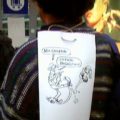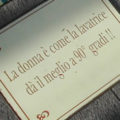In Italian, as in any language, there are many popular sayings and metaphors using animals, based on human perceptions of those animals’ lives and habits.
Cats
It seems that, in Italian culture, the distinguishing feature of cats is their greed for food.
Non c’e’ trippa per gatti
“There’s no tripe for cats.”
This is used when there’s absolutely no hope that you’ll get what you want. I suppose tripe is considered something that cats would like, but humans (at least some Italians) also like it, and are not about to share it with mere felines. At the European football championships in Athens (spring 2007), a group of Italian Milan fans unfurled a banner saying (in English) “There’s no tripe for cats,” meaning that there was no hope for the other team to win, though probably only the Italians understood it that way.
Tanto va la gatta al lardo che ci lascia lo zampino
“The [female] cat goes so often to the lard that [sooner or later] she will leave her little paw [print] in it.”
In other words, the cat is so irresistibly attracted to the lard (to eat it), that sooner or later you will know exactly whom to blame: a habitual malefactor will eventually be caught. This reflects the fact that many criminals don’t seem to have much imagination, but keep exploiting the same formula over and over again, which makes it easier for the good guys to catch them.
Dogs
Dogs are known for not having easy lives. Which is certainly true in Italy – urban dogs become neurotic cooped up in tiny apartments, and when out for their walks are the targets of hatred from non-dog-owners, who know that most Italian dog owners will not clean up after their pets, rendering city streets disgusting and parks hazardous for children to play in.
Every year thousands of dogs (and cats) are abandoned on the roadsides by families who are going away for the usual long vacation and can’t think of anything better to do with them. At this time of year the newspapers are full of pious “moral campaigns” pointing out that this is hazardous to humans as well as cruel to the animals: lost dogs wandering onto highways cause traffic accidents.
It’s not surprising that in Italian, as in English, people refer to…
Una Vita da Cani
“A dogs’ life.”
Dirlo ai Cani e Porci
“Tell it to dogs and pigs.”
To broadcast something, probably someone’s personal news, to every possible listener, no matter how unlikely to be interested.
Birds
Conosco i miei polli – “I know my [own] chickens”. Used when you know someone so well that you can predict how they will behave in a given situation. My own speculations on the origin of this phrase.
I know I’m missing more animal idioms – feel free to add!





In “Tanto va il gatto al lardo che, prima o poi, ci lascia lo zampino” gatto is usually in the feminine form (gatta).
One of my favourite animal sayings (even a little true about myself): “Gatto di marmo”, literaly “marble cat”, ironically used for someone with very slow reflexes and even a little clumsy, i think is more common in northern Italy than elsewhere
Ciao!
Haven’t noriced it yesterday, but your form fot the “gatto” and “lardo” one is quite longer than the usual one. the one i usually ear, with also the gender change is “Tanto va la gatta al lardo che ci lascia lo zampino”. The meaning is the same as the other form.
Ciao!
I heard one the other day. “E’ piu’ pigre che ventiquattro mucche” (He’s) more lazy than 24 cows. I liked it.
A couple more with cats:
“Via la gatta i topi ballano” (literally: when the cat is away, mice get dancing: meaning: when the boss is away people ignore the rules)
“Gatta ci cova” (literally: a cat is brooding; meaning: there is something fishy going on)
I wonder why they are all with she-cats…
And with other animals:
“Sputa il rospo” (lit: spit out the toad; meaning: spit it out, spill the beans)
How about “porco pulito non fu mai grasso?”
It is interesting to consider that in Anglo-Saxon countries the cat has 9 lives but in Italy only 7!
A presto
This thread is ancient, but I’ll post this here anyway. How do you call a cat or dog in Italian? I mean, in English dogs get “Here, girl!, or Here boy!”, while cats usually just get “Here, kitty, kitty!”.
Hmm, never thought of that, I guess because we never had any dogs or cats in Italy, and turtles don’t come when called! For cats people call “Micio micio micio” (pussy pussy pussy – not the rude kind) and make kissy noises. Dogs… I’ve never heard an equivalent of “here boy/girl.” “Vieni qui [name of dog]” I guess.
What an absolutely fascinating read. Culture reflects beautifully in our metaphoric language
I tried to signup for your RSS feed but it didn’t work. How can I do this?
Interesting read, I never though about that since I never had a dog when I was in Italy.
you forgot the wolf! so much of italian culture is based around il lupo! in boca lupo – good luck and all that!
“There’s no tripe for cats†the “REAL” HISTORICAL ORIGINS
Hoping to write in a proper (or at least understandable) English….
Non c’è trippa per gatti – “There’s no tripe for cats†has an Historical origin (see this site http://www.troppatrippa.com/articolo_trippapergatti.php )
Ernesto Nathan (October 5, 1848 – April 9, 1921) was elected mayor of the city of ROME in 1907; He retained the charge until 1913, and was elected for a second time in November 1911.
During a revision of the cash flow of the municipality (witch was not so “abundant” ) he noticed the expensive voice “frattaglie per gatti” (offal/organ meats for cats); he asked to the administrative assistant the meaning of that voice and he discovered that Rome municipality “adopted” a great number of cats to be used as keepers of all the documents hosted in Capitoline Hill archives against rats that could eat all that tasteful paper (or use it as a litter or as a “nest”).
The major cancelled that voice from the municipality budget and explained to the astonished administrative assistant that by that day all that cats could find their daily meal by caching those rats they were meant to catch.
This decision arrived to Rome citizen’s ears and they created the roman dialect expression “nun c’è trippa pe’ gatti” in Italian “non c’è trippa per gatti” with the meaning “there’s no (more) tripe for cats”.
There is no relation between the origin of the expression and the cat’s greed of this particular food; cats (especially those which lives in streets) could eats everything can prevent their death for starvation.
———————————————–
About Roberta’s opinion of why we (yes I’m Italian and I hope to speak English better then our former Prime Minister Silvio Berlusconi) have so many “she-cats” popular sayings: the female cat that gives birth to kittens has to find food by itself (or by herself?), remember that in the past (where all popular sayings were born) most of cats weren’t hosted in warm houses and daily fed, so the she-cat was more active in hunting or in stealing food (for “herself” to produce sufficient milk and after some time for the weaning of the kittens too).
In this way those “singles cat-mothers” were more often found in trying to steal lard, maybe even from a butcher shop who could also place some traps (so the little paw “she” leave behind could be more “solid” then a mere “footprint”, you have that “rabbit foot” thing) or trying to catch mice (and so, when “she” wasn’t hunting, all the mice could dance).
———————————————–
I leave you with another “animal idiom”
— raglio d’asino non giunge in cielo —
Translated:
(A) bray of (a) donkey doesn’t reach the sky (sky is intended with the meaning of heaven)
Explained:
If someone express a bad quote about you or your acting, and that person could be defined as stupid/ jealous/ lazy/ stubborn/ ignorant (or any other “bad†adjective you could use thinking about a donkey), so don’t worry about his/her quote because “bray of donkey doesn’t reach heaven†then (at the last judgment) the opinion of that “enlighten mind†won’t be heard over there in heaven.
The opinion (of the Lord) about you could not be affected by the thought of that poor mind.
This popular saying could be used as a direct reply (like in a tennis game) to someone who has expressed (in pubblic and on your face) a bad opinion about you, with the meaning to describe that “offender†as A DONKEY and (obviously) his/her opinions as A BRAY OF A DONKEY
Thanks – I especially lve “raglio d’asino” – never heard it before!
E’ testardo come un mulo As stubborn as a mule/pig-headed
E’ muto come un pesce Doesn’t speak
E’ sano come un pesce In perfect health – As fit as a fiddle
Fa pesci d’aprile To joke on 1 April – April Fools Day
Si lava come un gatto To wash little and badly
Vede al buio come un gatto See very welll
Siamo quattro gatti There’s only a few of us
Vita da cani A dog’s life – It’s a hard life
Sono come cane e gatto Enemies – to fight like cat and dog
E’ solo come un cane Have no one, no family or friends
E’ furbo come una volpe As smart as a fox
Fa un freddo cane It’s freezing cold
Actually, “there is no tripe for cats” has historical roots and has got nothing to do with greed.
Soon after Rome was conquered by the new-born kingdom of Italy, the first mayor of Rome had to reconcile a very tight budget and many expenses, as the previous “owner” (the Pope) had allocated many resources to lots of chapters. After all primary expenses were financed, the mayor was asked if there was something left for cats, as there used to be an allowance to buy tripe for stray cats. To which, he replied “Sorry, there’s no tripe for cats”.
Pretty trivial, but somehow it entered italian lingo….